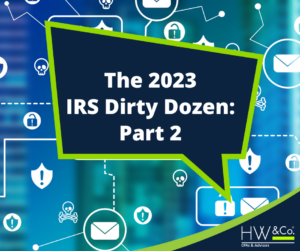 Earlier this week, we presented the first installment of the 2023 IRS Dirty Dozen: ERC promotions.
Earlier this week, we presented the first installment of the 2023 IRS Dirty Dozen: ERC promotions.
Here are two more prevalent scams from the campaign’s list for which taxpayers should stay on the lookout.
2. Phishing and Smishing
In their second Dirty Dozen warning this year, the IRS is urging taxpayers to be cautious of email and text scams, sometimes referred to as “phishing” and “smishing.”
- Phishing happens when a scammer sends an email that appears to be sent from a legitimate source, but it lures taxpayers into providing sensitive personal information or manipulates them into participating in certain schemes, such as receiving a phony tax refund, or convincing them that they have committed tax fraud.
- Smishing occurs via text or SMS message and uses a similar ploy, attempting to convince unwitting taxpayers that they need to click a link or take some other action to resolve a fictional issue. For example, victims might receive a text notifying them that their account is on hold until they click a link (which looks genuine but is actually unsafe) to restore their account.
It’s important to note that the IRS most often communicates via regular mail, and it will never contact taxpayers by email, text, or social media with regards to a bill or tax refund.
Phishing and smishing often escalate during tax season and the IRS urges vigilance.
“Email and text scams are relentless, and scammers frequently use tax season as a way of tricking people,” said IRS Commissioner Danny Werfel. “With people anxious to receive the latest information about a refund or other tax issue, scammers will regularly pose as the IRS, a state tax agency or others in the tax industry in emails and texts. People should be incredibly wary about unexpected messages like this that can be a trap, especially during filing season.”
3. Fake “Help” Setting Up an IRS Online Account
The third Dirty Dozen item featured in the campaign is related to scams offering taxpayers assistance with creating online accounts on the IRS’s website. Though the IRS offers a legitimate online account service, scammers will create fake programs offering help in setting up online accounts, which allows them to trick taxpayers into providing their tax and financial information. These fraudsters can then use this data to steal tax refunds and commit identity theft.
The full IRS news releases offer additional information and warnings:
- IR-2023-51: Dirty Dozen: Watch out for scammers using email and text messages to try tricking people during tax season
- IR-2023-54: Dirty Dozen: IRS warns of scammers offering “help” to set up an Online Account; creates identity theft risk for honest taxpayers
Learn more about the other entries in the IRS’s Dirty Dozen campaign:
IRS Dirty Dozen Part 1 – 2023 Campaign Kicks Off by Warning About ERC Schemes
IRS Dirty Dozen Part 3 – False Fuel Tax Credit Claims, Fake Charities, and Deceitful Tax Preparers
IRS Dirty Dozen Part 4 – Advice on Social Media, Spearphishing, and OIC Mills
IRS Dirty Dozen Part 5 – Schemes Aimed at High-Income Tax Filers, Bogus Tax Avoidance Strategies, and Schemes With International Elements
Stay tuned over the coming weeks as we continue to profile the remaining entries to keep you apprised of how to avoid evolving tax schemes.
For more information, please visit the IRS website or contact an HW&Co. Advisor today.
@2023



